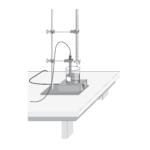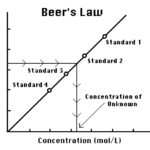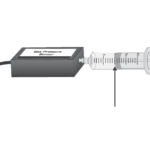Experiments
Here are experiments our science specialists have selected to support the IB* topic.

Acid-Base Titration
Experiment #7 from Advanced Chemistry with Vernier
In this experiment, you will
- Accurately conduct acid-base titrations.
- Determine the equivalence point of a strong acid-strong base titration.
- Determine the equivalence point of a weak acid-strong base titration.
- Calculate the molar concentrations of two acid solutions.

Determining the Concentration of a Solution: Beer's Law
Experiment #17 from Advanced Chemistry with Vernier
In this experiment, you will
- Prepare and test the absorbance of five standard copper (II) sulfate solutions.
- Calculate a standard curve from the test results of the standard solutions.
- Test the absorbance of a copper (II) sulfate solution of unknown molar concentration.
- Calculate the molar concentration of the unknown CuSO4 solution.
The Rate and Order of a Chemical Reaction
Experiment #25 from Advanced Chemistry with Vernier
In this experiment, you will
- Conduct the reaction of KI and FeCl3 using various concentrations of reactants.
- Determine the order of the reaction in KI and FeCl3.
- Determine the rate law expression for the reaction.

Exploring the Properties of Gases
Experiment #30 from Advanced Chemistry with Vernier
In this experiment, you will
- Conduct a set of experiments, each of which illustrates a gas law.
- Gather data to identify the gas law described by each activity.
- Complete the calculations necessary to evaluate the gas law in each activity.
- From your results, derive a single mathematical relationship that relates pressure, volume, temperature, and number of molecules.
- Educational Standard
- International Baccalaureate (IB)
- Subject
- Chemistry
- Section
- Core
- Topic
- 11. Measurement and Data Processing
* The IB Diploma Program is an official program of the International Baccalaureate Organization (IBO) which authorizes schools to offer it. The material available here has been developed independently of the IBO and is not endorsed by it.
